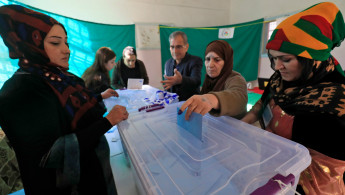Kurds vote in second phase of northern Syria polling
Long marginalised by the regime of President Bashar al-Assad, the Kurds set up an autonomous administration for territories they control in northern Syria following the outbreak of civil war in 2011.
The regime in Damascus rejects Kurdish aspirations but has hinted it could discuss some level of autonomy with the Kurds, who are estimated to account for around 15 percent of Syria's population.
In Qamishli, one of the main Kurdish cities in Syria, voters were queueing from early morning in front of polling stations to elect municipal councils, an AFP correspondent reported.
"I'm happy, we have the freedom to choose the one who is going to serve us," said voter Mohammed Saleh Mustafa, 54. "In the days of the Syrian regime, we were scared of the security services."
The conflict that is still tearing Syria apart broke out with the repression by the regime of pro-democracy demonstrations in 2011 that spread during the so-called Arab Spring.
The vote was expected to be dominated by the Democratic Union Party (PYD), the country's main Kurdish political group and which already runs an autonomous administration in northern and northeastern Syria.
Friday's polling was the second of three phases in an election process aimed at cementing their federal push.
The process started in September with elections at the most local district level and will be capped in January with a vote for a regional parliament.
Syria's Kurdish leadership says it does not want to secede and stresses that the electoral process is inclusive of minorities within their region, such as Arabs.
Turkey is opposed to the vote and accuses the PYD of organic links with the Kurdistan Workers Party (PKK), a Turkish Kurdish separatist group outlawed by Ankara.
 |




 Follow the Middle East's top stories in English at The New Arab on Google News
Follow the Middle East's top stories in English at The New Arab on Google News
![A group of Palestinians, foreign and Israeli activists gather to participated in an olive picking event on the land in the town of Battir, which is under threat of confiscation by Israel in Bethlehem, occupied West Bank on 8 November 2024. [Getty]](/sites/default/files/styles/image_330x185/public/2182930803.jpeg?h=199d8c1f&itok=__0LgGsa)

![People gathered around the rubble of destroyed houses to search for survivors [Getty]](/sites/default/files/styles/image_330x185/public/2024-11/GettyImages-2184733820.jpg?h=199d8c1f&itok=NiM1LO2f)